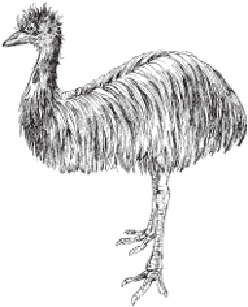Agriculture Reference
In-Depth Information
Emu
EMU SAFETY TIP
Emus are generally safe, but use caution around them so as not to be pecked in the
eye. They are not vicious, just naturally curious, and because their beaks are at eye
level, you want to be ready to fend off any exploration of the fascinating shiny sur-
face of your eye.
Breeding
Female emus begin to breed at about 18 months and continue to lay eggs for 15 years.
Emus lay a beautiful, dark, emerald green egg that is in itself a masterpiece. These eggs
take a considerable length of time to hatch — close to 56 days. If you let them naturally
incubate, you'll find it is the male that sets. The male will not leave the nest during the
period and will lose up to one-third of his weight. The female typically wanders off to
start another clutch of eggs.
Some find it easier to hatch emu eggs in an incubator, but you must regulate the hu-
midity and rigidly adhere to the temperature requirements. Before you consider hatching
the eggs in an incubator, however, be aware that with such a long incubation time, it's
difficult to maintain the humidity at a proper level. Incubating eggs that length of time
requires a great deal of monitoring and care. Your chances of success probably are far
higher if you start with young adults who will do the tricky work of incubating the eggs.


